
Lancet Regional Health-Americas
Scope & Guideline
Empowering Change Through Open Dialogue in Health
Introduction
Aims and Scopes
- Public Health Equity and Social Determinants:
The journal emphasizes research that explores health disparities and the social determinants affecting marginalized populations in the Americas. This includes studies on access to healthcare, socioeconomic factors, and systemic inequities. - Infectious Diseases and Global Health:
A significant focus is placed on infectious diseases, including COVID-19, Chagas disease, and other endemic conditions prevalent in the Americas. Methodologies often involve epidemiological studies, modeling, and public health interventions. - Environmental Health and Climate Change:
Lancet Regional Health-Americas addresses the intersection of environmental issues and health outcomes, exploring how climate change and pollution impact public health across the region. - Mental Health and Substance Use:
Research on mental health, substance use, and their interconnections is a core area, particularly in the context of the COVID-19 pandemic and its aftermath. - Healthcare Systems and Policy Analysis:
The journal publishes analyses of healthcare systems, policies, and practices, focusing on improvements in healthcare delivery and outcomes, particularly in low- and middle-income countries. - Child and Maternal Health:
There is a strong emphasis on maternal and child health, addressing issues such as prenatal care, child development, and the effects of socio-economic factors on health outcomes.
Trending and Emerging
- Impact of COVID-19 on Health Systems:
Research related to the COVID-19 pandemic continues to dominate, with increased focus on its effects on healthcare systems, mental health, and long-term health outcomes. - Climate Change and Health Interactions:
Emerging studies are increasingly exploring the implications of climate change on health, including environmental health impacts, resilience strategies, and the integration of climate considerations into public health policy. - Mental Health and Substance Use Disorders:
There is a noticeable trend towards addressing mental health issues, particularly in the context of the pandemic, focusing on anxiety, depression, and substance use among diverse populations. - Health Equity and Social Justice:
Research emphasizing health equity and social justice has gained momentum, with a focus on systemic inequities affecting marginalized communities and the need for inclusive health policies. - Innovative Public Health Solutions:
The journal is increasingly publishing studies on innovative and community-based public health interventions, particularly those that leverage technology and data for improved health outcomes. - Integration of Traditional and Modern Medicine:
An emerging theme is the integration of traditional health practices with modern medical approaches, particularly in indigenous populations, highlighting cultural competency in healthcare delivery.
Declining or Waning
- Traditional Public Health Interventions:
Research focusing on conventional public health interventions (such as vaccination campaigns) appears less frequently, possibly due to a shift towards more complex, multi-faceted approaches that integrate social determinants and systemic issues. - Non-communicable Diseases (NCDs):
Although still important, the volume of studies specifically dedicated to NCDs, such as diabetes and cardiovascular diseases, has decreased as emerging infectious diseases, particularly related to COVID-19, take precedence. - Chronic Disease Management:
Research on chronic disease management strategies has seen a decline, possibly overshadowed by the urgent need to address infectious diseases and mental health issues exacerbated by the pandemic. - Historical Health Perspectives:
There seems to be a reduction in publications focused on historical analyses of health systems and diseases, as the journal pivots towards contemporary issues and immediate public health challenges.
Similar Journals

Lancet Regional Health-Western Pacific
Advancing Health Insights Across the Western PacificLancet Regional Health-Western Pacific is a premier academic journal published by Elsevier, focusing on the diverse and dynamic field of health in the Western Pacific region. With an impressive Q1 ranking across several vital categories such as Geriatrics and Gerontology, Health Policy, Infectious Diseases, and Public Health, this journal is positioned at the forefront of health research and policy development. The journal aims to provide a platform for innovative research, reviews, and opinion pieces that lead to improved health outcomes and influence health policy across this geographically and culturally rich area. Offering open access to its content, Lancet Regional Health-Western Pacific ensures that the latest findings are readily available to researchers, professionals, and policymakers alike, ultimately contributing to the global discourse on health issues. As it continually strives to maintain rigorous publication standards, the journal serves as a crucial resource in promoting evidence-based practices and driving advancements in public health.

Ethiopian Journal of Health Development
Connecting research and practice to elevate community health.Ethiopian Journal of Health Development, published by the Department of Community Health at Addis Ababa University, serves as a vital platform for disseminating research focused on health developments in Ethiopia and the broader East African region. With an ISSN of 1021-6790 and an E-ISSN of 1021-6790, this journal encompasses a wide spectrum of topics within public health, infectious diseases, and environmental health, reflecting its commitment to advancing knowledge in these crucial areas. Spanning its coverage from 2010 to 2024, the journal is indexed in various databases, showcasing a burgeoning impact in its fields, albeit currently holding a Q4 category status in both Infectious Diseases and Public Health sectors. The journal aims to foster academic collaboration and provide insights that address pressing health challenges within communities, thereby serving as a significant resource for researchers, professionals, and students alike who are engaged in the quest to enhance health outcomes in resource-limited settings. Although it currently operates without Open Access, the journal remains dedicated to promoting rigorous scientific inquiry and delivering impactful findings that can influence policy and practice in health development.
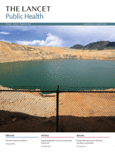
Lancet Public Health
Exploring the forefront of public health knowledge.The Lancet Public Health is a leading journal in the field of public health, published by Elsevier since 2016. With its prominent Q1 quartile ranking in Public Health, Environmental and Occupational Health according to Scopus for 2023, and an impressive percentile ranking of 99th, the journal has established itself as a vital resource for researchers, professionals, and students committed to advancing public health knowledge and practices. Operating under an Open Access model, this journal ensures that groundbreaking research is readily accessible to all, promoting global collaboration and knowledge sharing. The scope of The Lancet Public Health encompasses diverse aspects of health, including the social determinants of health, epidemiology, health policy, and preventive medicine, making it a cornerstone for addressing contemporary public health challenges. Located in the heart of the United Kingdom, it aims to influence health policies and practices worldwide, showcasing transformative research and fostering vibrant discussions within the field.
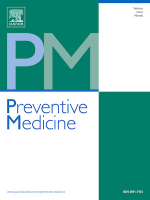
Preventive Medicine
Shaping tomorrow's public health through rigorous research.Preventive Medicine is a premier academic journal published by Academic Press Inc Elsevier Science, renowned for its influential contributions to the fields of Epidemiology and Public Health. Since its inception in 1946 and through its dedicated issues leading into 2024, the journal has established itself as a leading platform for cutting-edge research, boasting impressive Scopus rankings, with a notable Q1 status across relevant categories. This journal provides an essential forum for scholars, practitioners, and policy-makers interested in the prevention of diseases and the promotion of health within populations. With each issue, it disseminates valuable insights on preventive strategies, health behaviors, and epidemiological trends, making it crucial for anyone invested in the advancement of public health sciences. The journal does not offer open access options, ensuring that content remains relevant and targeted to its scholarly audience. Given its valuable contributions and recognition in the academic community, Preventive Medicine continues to play a pivotal role in shaping evidence-based approaches to health promotion and disease prevention in modern societal contexts.

Lancet Regional Health - Southeast Asia
Fostering Collaboration for Healthier CommunitiesLancet Regional Health - Southeast Asia, published by ELSEVIER, stands as a pivotal open-access journal established in 2022, dedicated to advancing regional health discourse across Southeast Asia. With its ISSN 2772-3682, this journal endeavors to provide a platform for high-quality research and innovative solutions in key areas such as Infectious Diseases, Psychiatry and Mental Health, and Public Health, Environmental and Occupational Health. Recognized for its exceptional quality, it has achieved Q1 rankings in these pressing categories, reflecting its commitment to publishing impactful findings that resonate with both the academic community and practitioners alike. The journal is vowed to fostering open access, enhancing the reach and applicability of its content to aid policy-making and community health advancements in the region. By facilitating access to groundbreaking research, Lancet Regional Health - Southeast Asia plays an essential role in shaping public health narratives and promoting collaboration among researchers, students, and healthcare professionals.
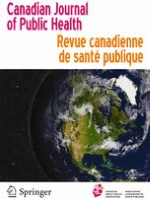
CANADIAN JOURNAL OF PUBLIC HEALTH-REVUE CANADIENNE DE SANTE PUBLIQUE
Fostering innovation in health systems worldwide.The Canadian Journal of Public Health - Revue Canadienne de Santé Publique, published by Springer International Publishing AG, stands as a pivotal platform for scholarly discourse in the fields of public health and environmental health. With its esteemed position in the Q1 category for both Medicine (miscellaneous) and Public Health, the journal boasts an impressive Scopus ranking that places it within the 80th percentile, reflecting its contribution to advancing knowledge and best practices in public health since its inception in 1945. Situated in Switzerland, this journal serves a global audience of researchers, professionals, and students dedicated to improving public health outcomes. Although it offers traditional access options, its rigorous peer-review process ensures that high-quality research remains at the forefront of its publications. Whether addressing emerging health issues or environmental challenges, the journal plays a vital role in shaping the conversation and policies that influence health systems worldwide.

Health Promotion and Chronic Disease Prevention in Canada-Research Policy and Practice
Advancing Canadian health through research and policy.Health Promotion and Chronic Disease Prevention in Canada - Research Policy and Practice is a leading open-access journal published by the Public Health Agency Canada. This journal, indexed with the ISSN 2368-738X, is dedicated to advancing the field of health promotion while addressing chronic disease prevention in the Canadian context. Since its inception in 2008, it has gained a robust reputation, evidenced by its ranking in the second quartile (Q2) across multiple categories including Epidemiology, Health Policy, and Public Health, Environmental and Occupational Health. With its emphasis on research and policy implications, the journal serves as a critical resource for researchers, healthcare professionals, and students alike, aiming to promote evidence-based practices and driving discussions that shape public health policies. The journal is particularly noted for its triangulation of research findings into actionable strategies, making it relevant for both academic inquiry and practical application. Whether you are seeking to enhance your knowledge or contribute to the discourse on chronic disease prevention, this journal offers a platform for sharing impactful research and innovative ideas.
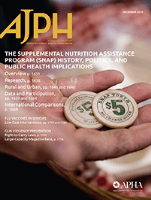
AMERICAN JOURNAL OF PUBLIC HEALTH
Advancing public health knowledge for a healthier tomorrow.The American Journal of Public Health, published by the American Public Health Association, stands as a cornerstone in the field of public health and epidemiology since its inception in 1949. With its rigorous peer-review process and a robust commitment to advancing knowledge and research practices, this journal holds a prestigious position in the academic community, as reflected in its 2023 Scopus ranking, where it is placed in the top percentile (93rd) within the categories of Public Health and Environmental and Occupational Health. The journal's focus encompasses a broad spectrum of public health topics, making it essential reading for researchers, practitioners, and students dedicated to improving population health. Subscribers can access invaluable insights through its collection of innovative studies and reviews, thereby reinforcing the journal's role in shaping public health policy and practice. By bridging research and real-world application, the American Journal of Public Health remains a vital resource for those engaged in the quest to improve health outcomes across diverse communities.

Global Health Action
Elevating public health discourse for a better tomorrow.Global Health Action, published by Taylor & Francis Ltd, is a premier academic journal dedicated to advancing the field of global health, particularly in health policy and public health. Since its inception in 2008, this Open Access journal has played a pivotal role in fostering knowledge dissemination and collaborative research, allowing for a wider reach and engagement within the global health community. With a prestigious Q1 ranking in both Health Policy and Public Health, Environmental and Occupational Health categories as of 2023, it emphasizes high-quality, impactful research that addresses pressing global health challenges. The journal serves as a vital platform for researchers, professionals, and students to share their findings and insights, thereby contributing to the broader discourse on health equity, sustainability, and policy effectiveness. Situated in the United Kingdom, Global Health Action continues to lead the charge in promoting innovative solutions and evidence-based approaches to health issues worldwide, making it an indispensable resource for anyone committed to improving global health standards.
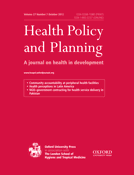
HEALTH POLICY AND PLANNING
Transforming Health Systems with Innovative Research.HEALTH POLICY AND PLANNING is a prestigious academic journal published by Oxford University Press that focuses on the critical issues related to health policy and its impact on global health systems. Since its inception in 1986, this journal has rapidly established itself in the field, holding a distinguished position in the Q1 category of Health Policy, with a notable Scopus ranking of #57 out of 310, placing it in the 81st percentile. By providing a platform for empirical research, theoretical analyses, and policy discussions, HEALTH POLICY AND PLANNING aims to contribute to the development and improvement of health policies worldwide. As a valuable resource for researchers, professionals, and students alike, it fosters a deeper understanding of health system challenges and encourages the dissemination of innovative solutions. Although the journal does not offer open access, it remains an essential publication for those engaged in shaping the future of global health policy.